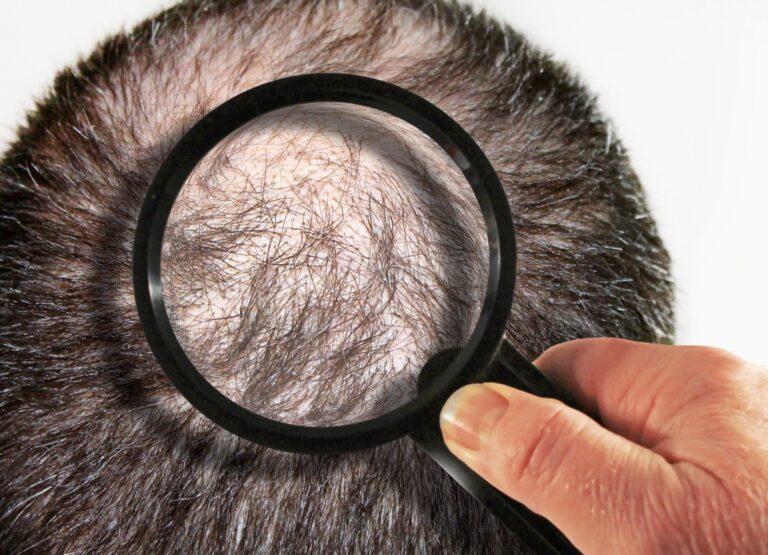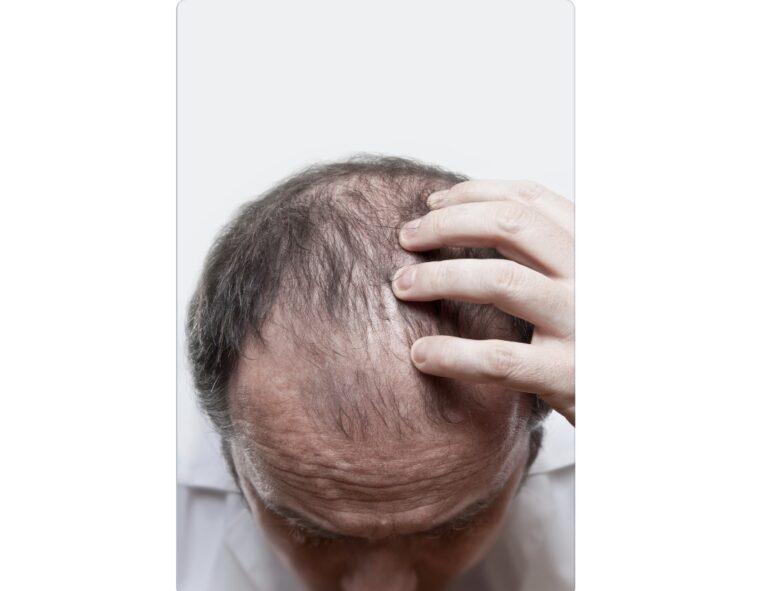
Most men experience some degree of hair loss in their lives. And while we’d all love a permanent cure for baldness, it’s one of the holy grails of modern science. It always feels just too far out of reach!
But there is hope. Whilst that cure hasn’t been found yet, some recent scientific breakthroughs look promising. It could be on the horizon! Read on and we’ll explain why a permanent cure for baldness might not be too far away and what you can do to fight back against hair loss today.
What causes baldness in men?
A lot of things can make you lose your hair – from illnesses to certain medications and even stress. But when we talk about baldness in men what we’re usually referring to is male pattern baldness (MPB).
MPB is the most common cause of hair loss in men and it makes you lose hair permanently on your head. This usually happens on the top at the back (your crown) and along your hairline first, hence the name pattern baldness. For most men MPB starts in their 40s or 50s but it can begin in your 30s or even at a younger age.
What causes male pattern baldness?
Ageing, genetics, and hormones all play their part when it comes to MPB. But when we’re talking hormones, we’re talking dihydrotestosterone (DHT). Your body makes DHT from testosterone. And whilst DHT can stimulate hair growth in puberty, as you get older it begins to have the opposite effect on your head.
DHT attaches to the hair follicles in your scalp and begins to shrink the follicles. As the follicles contract they produce gradually shorter and finer hairs. This continues until they close up altogether and no hair is produced at all. This is why your hair thins before you go bald.
Is there a permanent cure for baldness?
Unfortunately not. Despite what you might read online there is currently no permanent cure for baldness. A lot of the advice and miracle products you’ll find online aren’t actually supported by scientific evidence. Basically, they don’t work.
But there are some genuine baldness treatments that do have scientific evidence to support them. A permanent cure may be on the horizon too.
How close is a cure for baldness?
Research to better understand the causes and mechanisms of MPB is ongoing and new treatments are in development. With new genetic technology coming into use it feels like a permanent cure for baldness is close. However, it’s difficult to say when this cure will arrive.
Some of the most promising lines of permanent baldness cure research include:
Stem cell baldness treatments
Stem cells are natural cells found in your body. What makes stem cells special is that they haven’t become a specific cell type yet, like a hair cell or skin cell. Stem cells are early cells that can become almost any cell type. This includes fresh hair follicle cells.
Researchers are investigating if stem cells can be used to regenerate hair follicles to reverse the shrinkage caused by DHT. A team in California and a team in Japan have both recently grown human hair follicles on the skin of mice using stem cells, proving the approach works. More research and clinical trials are needed before the technology can be used in people though.
New baldness drugs
Scientists are also working on a number of pharmaceutical drugs that could offer a permanent cure for baldness. One team at Manchester University is investigating a medication called cyclosporine A that has the ability to speed up the growth of hair from scalp follicles. A lab at Columbia University Medical Center in New York is researching drugs called JAK inhibitors that can keep hair follicles in the growth stage of the hair cycle for longer, encouraging them to produce thicker and longer hair.
Laser treatments for hair loss
Research into using lasers to stimulate hair growth has already shown some decent results. The idea is that low-level lasers (low-power lasers) can be used to improve circulation in the scalp. This improves blood flow and the delivery of oxygen and nutrients to your hair follicles, promoting them to grow longer and thicker hairs. A review of 21 studies of low-level laser therapy showed it was a safe and effective way to encourage hair growth.
Low-level laser hair loss treatments don’t offer a permanent cure for baldness today, but they are now available as professional treatments and products you can use at home. Laser therapy may help you slow baldness and even regrow some lost hair.
Current hair loss treatments for men
The above technologies are promising but further research and refinement is needed before they become proven commercial hair loss treatments. Beware – you can already find “stem cell” hair loss treatments online but these are not the genuine thing.
But what about the here and now? Although there are lots of dubious and fraudulent hair loss treatments out there, they’re not all snake oil. When it comes to fighting baldness with science you’ve got a few options:
- Finasteride (also sold as Propecia) is a scientifically proven treatment for MPB. It’s a prescription medication you take as a tablet and it works by lowering levels of DHT in your scalp. Finasteride blocks an enzyme (called type II 5α-reductase) that converts testosterone to DHT. This reduces DHT levels, slowing follicle miniaturization, and even encouraging your hair to grow back thicker
- Minoxidil (also sold as Rogaine) is applied directly to your scalp and helps prevent hair loss by improving the flow of blood, oxygen, and nutrients to your hair follicles. Minoxidil and finasteride can be used together
- Your other option to fight MPB is a hair transplant. This is where damaged hair follicles are removed and replaced with healthy follicles from elsewhere on your scalp. Hair transplants can be effective but they are a temporary measure, as the transplanted follicles will begin to shrink. Treatment can also be expensive
How to cure hair loss from stress
If you’re losing hair due to stress (called telogen effluvium) then the good news is that if you can reduce your stress levels your hair should grow back. How you tackle stress effectively is individual to you. It could be through yoga, meditation, playing football, playing video games, or enjoying a night out with the boys. Don’t feel guilty about taking time out. It’s good for both your mental health and your hair.
Can balding hair grow back?
This depends on what’s causing your hair loss. If it’s due to stress, illness, or a medication you’re taking then your hair should grow back when you’ve addressed the cause. However, with male pattern baldness, the hair loss is permanent if left untreated. Prescription hair loss treatments like finasteride can reverse some hair loss though, especially if used quickly when you first notice your hair is thinning.
Will baldness ever be cured?
Hair loss is complex and difficult to treat. But at NowPatient we’re confident a permanent baldness cure will be found. Current research (particularly stem cell technology and new pharmaceutical products) is already producing promising results. We’re sure it’s a question of “when” and not “if” we get a permanent cure for baldness.
Sources
Medical Disclaimer
NowPatient has taken all reasonable steps to ensure that all material is factually accurate, complete, and current. However, the knowledge and experience of a qualified healthcare professional should always be sought after instead of using the information on this page. Before taking any drug, you should always speak to your doctor or another qualified healthcare provider.
The information provided here about medications is subject to change and is not meant to include all uses, precautions, warnings, directions, drug interactions, allergic reactions, or negative effects. The absence of warnings or other information for a particular medication does not imply that the medication or medication combination is appropriate for all patients or for all possible purposes.








